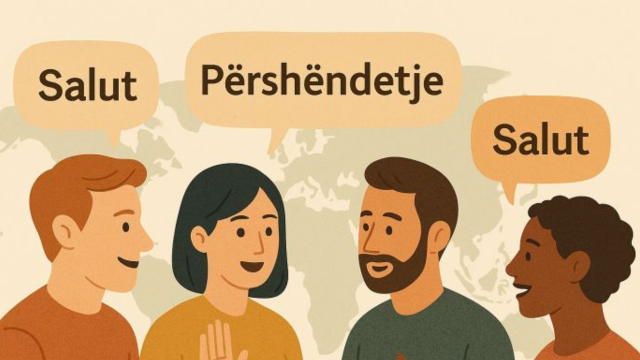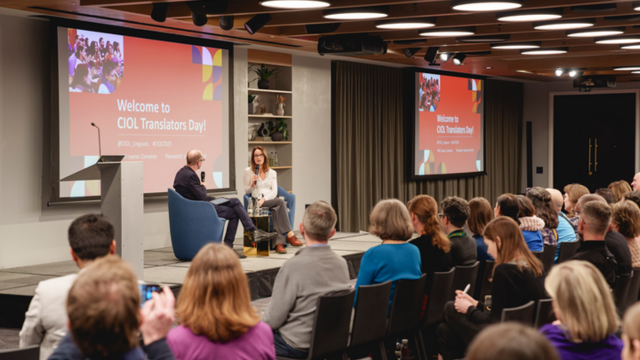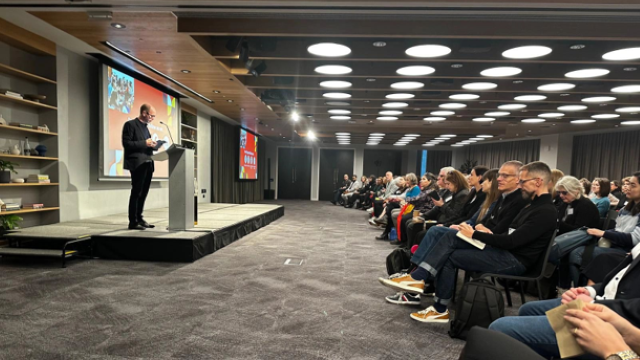-
QUALIFICATIONS
- For Linguists Worldwide
- For UK Public Services
- Preparation
- Policies & Regulation
-
MEMBERSHIP
- Join CIOL
- Membership grades
- NEW for Language Lovers
- Chartered Linguist
- Already a member?
- Professional conduct
- Business & Corporate Partners
-
ASSESSMENTS
- For Second Language Speakers
- English as a Second Language
-
EVENTS & TRAINING
- CPD, Webinars & Training
- CIOL Conference Season 2025
- Events & Networks
- CIOL Mentoring
-
NEWS & VOICES
- News & Voices
- CIOL eNews
- CIOL Awards
- The Linguist
- Jobs & Ads
-
RESOURCES
- For Translators & Interpreters
- For Universities & Students
- Standards & Norms
- CIOL & AI
- All Party Parliamentary Group
- In the UK
- UK Public Services
- Find-a-Linguist
The Road to Multilingualism
By Anna Ostrovsky

How languages shape our identity
Growing up in Germany as a Russian native speaker I would work diligently on eliminating my jarring Russian accent. From reciting Rilke to pre-meditating set phrases until I would feel safe enough to speak up in class: self-conscious and attuned to the slightest reaction to the slightest nuance in my speech, I would make use of all the tools to fine-tune my pronunciation, adapt my pitch, practise the perfect cadence and mimic mannerisms until my German alter ego became quasi second nature:
“You don’t come across as German at all – I have a friend who’s actually German; she’s very different from you!”
“I thought you might be Russian – Russians have such a distinct accent!”
“I thought you might be German – you have a strong accent!”
“Excusez-moi, Mademoiselle, j’ai entendu un petit accent. Vous êtes Anglaise?”
Speakers and listeners worldwide make assumptions about “the other”, based on stereotypes, historical representations and perceptions outside of the language as such1.
Some languages, varieties and accents are considered legitimate2, and therefore speakers of those languages are deemed “worthy” and attractive.
“Received Pronunciation” or “Parisian French” to make you sound like a “native speaker”, anyone?
Such biased attitudes towards languages and cultures have the power to shape our identity and our rapport to ourselves and to “the other”.
As an early bilingual, I experienced a considerable amount of loss of identity, with its by-products: inadequacy and “linguistic insecurity”3. As a speaker of a minority language, to assimilate and become part of the “tribe” was the only way for me to feel safe enough to “survive”. And the only way to do so was to develop a German persona to blend in with the cultural and linguistic norm of my host country.
Yet language is rooted in heritage and ethnicity. It is a reflection of a cultural identity difficult to conceal; a resonance and a vibe nearly impossible to fake.
Being truly multilingual and multicultural is in the “being” and the “feeling” as much as it is in the “sounding” and the “thinking”. The emotional rapport to the language is, therefore, the most important part of language acquisition.
In a quest to regain confidence and my identity, I would look for languages outside of my heritage, now deemed by others (and by myself) as “less desirable”. Languages that would allow me to be Russian without sounding Russian. Sounds that would resonate with my vocal cords and my temperament. Languages such as French, Spanish and, perhaps surprisingly, English. Words that would help me voice the part of my identity that I was not able to express in German.
Meanwhile, teaching German as a foreign language made me question if I was truly delivering as a carrier of the German language and culture:
Am I being authentic in my role as a (monolingual?) native speaker of German?
Am I able to convey an unbiased view of the culture and the feel of the language beyond grammar?
What if I let my Russian accent or an idiom slip into my German persona?
Will students and colleagues consider me a fraud?
Do I need to hide my heritage and watch every single move I make?”
Conversely, most of today’s expats were raised as “balanced bilinguals”, speaking two or more languages at home, while learning a third, “legitimate” and “high status” language at school. Others learned a second language at a mature stage in their life, once they were grounded and secure in their mother tongue and clear on their heritage, and became “late bilinguals”4.
No two speakers are alike. Depending on the context and personal characteristics, some bilinguals are more self-conscious than others; some want to get rid of their accent, whilst others can’t be bothered; some people feel connected to a culture different to their heritage, others prefer to communicate in their mother tongue.
In the current environment, “Global English” as a widely adopted norm has absorbed a variety of cultures, providing a common denominator for people to bond and to feel safe to express themselves at any stage on the multilingual continuum – I have yet to meet a Russian-, French-, German-, Italian-, Chinese-, Arabic- or Spanish-speaking colleague embarrassed to speak English or trying to camouflage their heritage!
Language is as personal as it is social. It has the power to make us feel intrusive or welcome; empowered or disempowered; attractive or outcast. Multilingualism is, therefore, the best tool to develop empathy and defy stereotypes to foster universal understanding.
Every once in a while I will feel the urge to read a couple of lines by Hermann Hesse or to enjoy a performance of Massenet’s Werther to gain a different angle on Goethe's classic. Other times I might be moved by a French movie, a show in the West End, a Spanish adaptation of Tolstoy’s Anna Karenina, or a piece of Russian poetry – that universal resonance of language and its power to help us shape a balanced view of culture is, to me, the ultimate benefit of multilingualism.
Notes
1 Pustka/Krefeld, 2010
2 Labov, 1976; Bourdieu, 1982
3 Labov, 1976
4 Guerrero 2010
Anna Ostrovsky BA MA MCIL CL holds a BA in Comparative Literature and an MA in Romance Languages from the University of Munich. She works for a franco- and hispanophone firm in London and speaks English, German, French, Russian and Spanish. Anna is a member of CIOL’s ED&I and Membership Committees.
You can read her full biography here: https://linkedin.com/in/annaostrovsky
Views expressed on CIOL Voices are those of the writer and may not represent those of the wider membership or CIOL.
Recommended Reading
Bourdieu, Pierre (1982) Ce que parler veut dire. L'économie des échanges linguistiques, Fayard, Paris.
Bourdieu, Pierre (1985) La Distinction. Critique sociale du jugement, Les Editions de Minuit, Paris.
Calvet, Louis-Jean (1999) Pour une écologie des langues du monde, Plon, Paris.
Guerrero, Carmen Helena (2010): Elite Vs. Folk Bilingualism: The Mismatch between Theories and Educational and Social Conditions, in: HOW 17, p. 165-179, Bogotá. Colombia (accessible via: https://files.eric.ed.gov/fulltext/EJ1127950.pdf (Download: August 2023)
Krefeld, Thomas/Pustka, Elissa (2010): Für eine Perzeptive Varietätenlinguistik, in: Spazi Comunicativi. Kommunikative Räume, p.9-28, Published by Sabina Canobbio, Mari D'Agostino and Thomas Krefeld, Vol. 8, Peter Lang Verlag, München. (accessible via: https://epub.ub.uni-muenchen.de/14736/1/14736.pdf (Download: August 2023)
Labov, Wilhelm (1976) Sociolinguistique, Editions de Minuit, Paris.
Filter by category
More
The Chartered Institute of Linguists (CIOL), Incorporated by Royal Charter, Registered in England and Wales Number RC 000808 and the IoL Educational Trust (IoLET), trading as CIOL Qualifications, Company limited by Guarantee, Registered in England and Wales Number 04297497 and Registered Charity Number 1090263. CIOL is a not-for-profit organisation.








